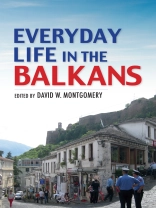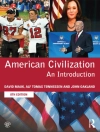Everyday Life in the Balkans gathers the work of leading scholars across disciplines to provide a broad overview of the countries of Albania, Bosnia and Herzegovina, Bulgaria, Croatia, Greece, Kosovo, Macedonia, Romania, Serbia, and Turkey. This region has long been characterized as a place of instability and political turmoil, from World War I, through the Yugoslav Wars, and even today as debate continues over issues such as the influx of refugees or the expansion of the European Union. However, the work gathered here moves beyond the images of war and post-socialist stagnation which dominate Western media coverage of the region to instead focus on the lived experiences of the people in these countries. Contributors consider a wide range of issues including family dynamics, gay rights, war memory, religion, cinema, fashion, and politics. Using clear language and engaging examples, Everyday Life in the Balkans provides the background context necessary for an enlightened conversation about the policies, economics, and culture of the region.
สารบัญ
Preface
Acknowledgements
1. Seeing Everyday Life in the Balkans / David W. Montgomery
Section I: The (Historical) Context of Everyday Life
2. Early Balkan Everyday Life / Andrew Wachtel
3. Crimes and Misdemeanors: Scenes of Everyday Life among the Gendarmerie in Ottoman Macedonia, ca. 1900 / Ipek K. Yosmaoğlu
4. It’s What’s Inside That Counts: Furnishing the Modern in the Apartments of Socialist Yugoslavia / Patrick Hyder Patterson
5. Consuming Lives: Inside the Balkan Kafene / Mary Neuburger
6. Burek, Da! Sociality, Context, and Idiom in Macedonia and Beyond / Keith Brown
Section II: The Home(s) of Everyday Life
7. Kinship and Safety Nets in Croatia and Kosovo / Carolin Leutloff-Grandits
8. ‘This Much We Know’: Domestic Remedies and Quotidian Tricks since Tito’s Bosnia / Larisa Jašarević
9. Femininity, Fashion, and Feminism: Women’s Activists in Bosnia-Herzegovina / Elissa Helms
10. That Black Cloud upon Our Family: Everyday Life of Gays and Lesbians in Slovenia / Roman Kuhar
11. Between Past and Future: Young People’s Strategies for Living a ‘Normal Life’ in Post-war Bosnia-Herzegovina / Monika Palmberger
12. ‘But Where Else Could They Go?’ The State, Family, and Private Care in a Bosnian Town / Azra Hromadžić
Section III: The Livelihoods of Everyday Life
13. Cars, Coffee, and ‘The Crisis’: Balkan Migration in Precarious Times / Ana Croegaert
14. ‘We Don’t Belong Anywhere’: Everyday Life in a Serbian Town Where Immigrants Are Former Refugees / Mila Dragojević
15. Neoliberal Spaces of Immorality: The Creation of a Bulgarian Land Market and ‘Land-grabbing’ Foreign Investors / Deema Kaneff
16. Making Ends Meet in a Rural Community: The Life and Times of Aleksandar Živojinović / Andrew Konitzer
17. A Lot of Sweat, a Little Bit of Fun, and Not Entirely ‘Hard Men’: Worker’s Masculinity in the Uljanik Shipyard / Andrea Matošević
18. Perceptions of Balkan Belonging in Post-dictatorship Greece / Daniel M. Knight
Section IV: The Politics of Everyday Life
19. Neither the Balkans nor Europe: The ‘Where’ and ‘When’ in Present-day Albania / Nataša Gregorič Bon
20. Growing Up in Montenegro: A Story of Transformation and Resistance / Jelena Džankić
21. War Criminals, National Heroes, and Transitional Justice in Macedonia / Vasiliki P. Neofotistos
22. A Lively Border / Čarna Brković and Stef Jansen
23. ‘Politicians Are All Crooks!’ Everyday Politics in Bulgaria / Emilia Zankina
24. Life among Statues in Skopje / Ilká Thiessen
Section V: The Religion(s) of Everyday Life
25. ‘The Hardest Time was the Time without Morality’: Religion, Transition, and Social Navigation in Albania / David W. Montgomery
26. Ramadan in Prizren / Frances Trix
27. The Cross at the Crossroads: The Feast of Slava between Faith and Custom / Milica Bakić-Hayden
28. Boundaries of Freedom, Boundaries of Responsibility: Everyday Religious Life of Croatian Catholic Women / Slavica Jakelić
29. Religious Boundaries, Komsholuk, and Sharing Sacred Spaces in Bulgaria / Magdalena Lubanska
30. The Everyday of Religion and Politics in the Balkans / Albert Doja
Section VI: The Art of Everyday Life
31. Unintentional Memorials: Everyday Places of Memory in Post-transition Bucharest / Alyssa Grossman
32. Between East and West, Folk and Pop, State and Market: Changing Landscapes of Bulgarian Folk Music / Carol Silverman
33. Mothers in Balkan Film / Yana Hashamova
34. Memories of Foreign Love / Ervin Hatibi
35. The Sound of Charcoal Rustling: Drawing from Life in Belgrade / Marko Živković
Postface / David W. Montgomery
Index
เกี่ยวกับผู้แต่ง
Milica Bakić-Hayden teaches at the Department of Religious Studies, University of Pittsburgh. Čarna Brković is Postdoctoral Researcher at the Graduate School for East and Southeast European Studies, Regensburg. She is author of Managing Ambiguity: How Clientalism, Citzenship and Power Shapes Personhood in Bosnia and Herzegovina and editor with Stef Jansen and Vanja Čelebičić of Negotiating Social Relations in Bosnia and Herzegovina: Semiperipheral Entanglements. Keith Brown teaches in the Department of International Relations at Brown University. Ana Croegaert is Assistant Professor of Anthropology and Sociology at the University of New Orleans. Albert Doja is Professor of Sociology and Anthropology at the University of Lille, France, and Chair of Anthropology of the National Academy of Sciences, Albania. Mila Dragojević is Associate Professor of Politics at the University of the South. She is author of The Politics of Social Ties: Immigrants in an Ethnic Homeland. Jelena Džankić is Research Fellow at the Robert Schuman Centre for Advanced Studies and coordinates the work of the EUI’s Global Citizenship Observatory. She is author of Citizenship in Bosnia Herzegovina, Macedonia and Montenegro: Effects of Statehood and Identity Challenges. Nataša Gregorič Bon is Research Fellow at the Institute of Anthropological and Spatial Studies of the Research Centre of the Slovenian Academy of Sciences and Arts (ZRC SAZU) and Assistant Professor at the Postgraduate School ZRC SAZU. She is editor with Jaka Repič of Moving Places: Relations, Return and Belonging and author of Spaces of Discordance: Ethnography of Space and Place in the Village of Dhërmi/Drimades, Southern Albania. Alyssa Grossman is Postdoctoral Researcher in Artistic Practice at Valand Art Academy, University of Gothenburg. Yana Hashamova is Professor and Chair of the Department of Slavic and East European Languages and Cultures and Associate Researcher at the Institute of Culture and Memory Studies, at the Research Centre of the Slovenian Academy of Sciences and Arts. Ervin Hatibi is an Albanian poet, essayist, and painter. His books of poetry include Përditë Shoh Qiellin; Poezi; and Pasqyra e Lëndës. He is author of Republick of Albanania. Elissa Helms is Associate Professor and Head of the Department of Gender Studies at the Central European University. She is author of Innocence and Victimhood: Gender, Nation, and Women’s Activism in Postwar Bosnia-Herzegovina and editor with Xavier Bougarel and Ger Duijzings of The New Bosnian Mosaic: Identities, Memories, and Moral Claims in a Post-war Society. Azra Hromadžić is Assistant Professor of Anthropology at Syracuse University. She is author of Citizens of an Empty Nation: Youth and State-making in Postwar Bosnia and Herzegovina. Slavica Jakelić is Associate Professor of Humanities and Social Thought at Christ College at Valparaiso University. She is co-editor of The Future of the Study of Religion and Crossing Boundaries: From Syria to Slovakia, and author of Collectivistic Religions: Religion, Choice, and Identity in Late Modernity. Stef Jansen is Senior Lecturer in Social Anthropology at the University of Manchester. He is author of Yearnings in the Meantime: ‘Normal Lives’ and the State in a Sarajevo Apartment Complex and co-editor of Negotiating Social Relations in Bosnia and Herzegovina: Semiperipheral Entanglements. Larisa Jašarević is Senior Lecturer in the Global Studies Program at the University of Chicago. She is author of Health and Wealth on the Bosnian Market: Intimate Debt (Indiana University Press, 2017). Deema Kaneff is Reader in Social Anthropology at the University of Birmingham and an Associate at the Max Planck Institute for Social Anthropology. She is author of Who Owns the Past? The Politics of Time in a ‘Model’ Bulgarian Village. Daniel M. Knight is Lecturer in Social Anthropology and Leverhulme Fellow at the University of St Andrews, and Visiting Fellow at the Hellenic Observatory, London School of Economics and Political Science. He is author of History, Time, and Economic Crisis in Central Greece, and editor with Charles Stewart of Ethnographies of Austerity: Temporality, Crisis and Affect in Southern Europe. Andrew Konitzer is a former Research Scholar at the Woodrow Wilson International Center for Scholars’ Kennan Institute for Advanced Russia Studies. He is author of Voting for Russia’s Governors: Regional Elections and Accountability under Yeltsin and Putin. Roman Kuhar is Professor of Sociology at the University of Ljubljana. His books include Media Construction of Homosexuality, and he is editor with Judit Takács of Doing Families: Gay and Lesbian Family Practices. Carolin Leutloff-Grandits is Postdoctoral Research Fellow at the Centre for Southeastern European History and Anthropology at the University of Graz. Magdalena Lubanska is Assistant Professor at the Institute of Ethnology and Cultural Anthropology at the University of Warsaw. She is author of Muslims and Christians in Bulgarian Rhodopes. Studies in Religious (Anti)Syncretism. Andrea Matošević is Assistant Professor at the Juraj Dobrila University of Pula. He co-founded Centre for Cultural and Historical Research of Socialism and has published several books in Croatian on the anthropology of work and discourses of Balkan socialism. David W. Montgomery is Director of Program Development for CEDAR—Communities Engaging with Difference and Religion. He is author of Practicing Islam: Knowledge, Experience, and Social Navigation in Kyrgyzstan and author with Adam B. Seligman and Rahel R. Wasserfall of Living with Difference: How to Build Community in a Divided World. Vasiliki Neofotistos is Associate Professor of Anthropology at the State University of New York at Buffalo. She is author of The Risk of War: Everyday Sociality in the Republic of Macedonia. Mary Neuburger is Professor of History, Director of the Center for Russian, East European, and Eurasian Studies (CREEES), and Chair of Slavic and Eurasian Studies at the University of Texas of Austin. She is author of The Orient Within: Muslim Minorities and the Negotiation of Nationhood in Modern Bulgaria, Balkan Smoke: Tobacco and the Making of Modern Bulgaria. She is editor with Paulina Bren of Communism Unwrapped: Consumption in Cold War Eastern Europe. Monika Palmberger is Visiting Professor at the University of Leuven and Hertha Firnberg Research Fellow at the University of Vienna. She is author of How Generations Remember: Conflicting Histories and Shared Memories in Post-War Bosnia and Herzegovina, and editor with Jelena Tošić of Memories on the Move: Experiencing Mobility, Rethinking the Past. Patrick Hyder Patterson is Associate Professor of History at the University of California, San Diego. He is author of Bought and Sold: Living and Losing the Good Life in Socialist Yugoslavia. Carol Silverman is Professor of Cultural Anthropology and Folklore at the University of Oregon. She is author of Romani Routes: Cultural Politics and Balkan Music in Diaspora. Ilká Thiessen is Professor of Anthropology at Vancouver Island University. She is author of Waiting for Macedonia: Identity in a Changing World. Frances Trix is Professor Emerita of Anthropology at Indiana University. Her most recent book is Urban Muslim Migrants in Istanbul: Identity and Trauma among Balkan Migrants. Andrew Wachtel is President of the American University of Central Asia in Bishkek, Kyrgyzstan. He is a fellow of the American Academy of Arts & Sciences, a member of the Council on Foreign Relations, and an active translator from multiple Slavic languages. Ipek K. Yosmaoğlu is Associate Professor of History at Northwestern University. She is author of Blood Ties: Religion, Violence, and the Politics of Nationhood in Ottoman Macedonia. Emilia Zankina is Associate Professor of Political Science and Provost of the American University in Bulgaria. Marko Živković is Associate Professor of Anthropology Department at the University of Alberta, Edmonton, Canada. He is author of Serbian Dreambook: National Imaginary in the Time of Milošević (Indiana University Press, 2011).












